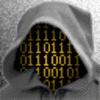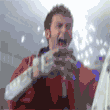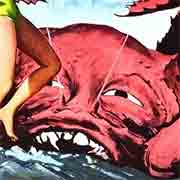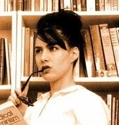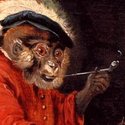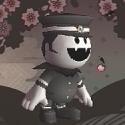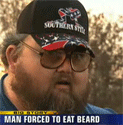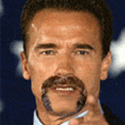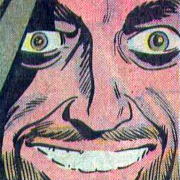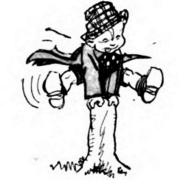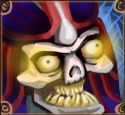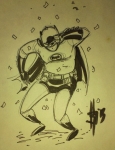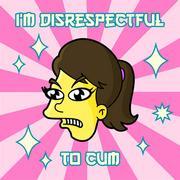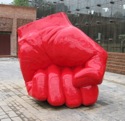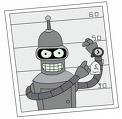|
Just finished All the Pretty Horses and Child of God, both by Cormac McCarthy. I highly recommend both books and I am going to move on to Blood Meridian.
|
|
|
|

|
| # ? May 14, 2024 16:04 |
|
It's been a whirlwind since school started again but here are two novels in recent memory: Thirteen Moons, Charles Frazier Very good. All of your escapist fantasies about the woods and mountains set in an interesting time with amazing local history throughout the novel. Oil!, Upton Sinclair Picked it up because of my man crush on Daniel Day Lewis as Daniel Plainview in There Will Be Blood, and my never-ending search for escape in either sci-fi or the American frontier. To my surprise, the narrator is focused on the son, HW Plainview, rather than Daniel Plainview. (The names are different in the book as well.) The book reads like a couple of different timelines. I: You saw this in the movie II: Very interesting fork, the movie is inspired by but not based on Oil! III: I totally started waiting for a Siddartha metaphor IV: Zdrastvooyetye Comrade! The movie is drawn from the first ~150 pages or so. 90% of this story you have not heard, if you have seen the movie. I recommend it highly.
|
|
|
|
Pynchon's Against The Day. God-loving-drat. I'll readily admit I got lost a number of times throughout this because it's a massive (the hardcover I read clocks in at 1085 pages) sprawling epic that covers the years from the 1893 World's Fair to the years following World War I, as seen through the lives of a massive cast of characters. Still, I never really got the urge to stop reading. There's always something interesting happening and somehow Pynchon manages to tie everything together in a complex web of balloonists, anarchists, secret societies, revolutionaries, detectives, etc. with the theme of duality running through the whole narrative. Much like Gravity's Rainbow, I'm definitely going to have to read this again to try to get a better handle on it, though I did find ATD a lot easier to follow. All in all, a brilliant book and definitely has Pynchon moved into my list of favorite authors after reading this and Mason & Dixon.
|
|
|
|
A Study in Scarlet. This was motivated partially by the upcoming TV series and movie based on Sherlock Holmes. Beginning of Part 2 is a little tough to get through by comparison to the rest of the book, but it's worth sticking through it.
|
|
|
|
After the Plague by T.C. Boyle. I don't know why Boyle keeps getting described as funny, nothing I've read by him can be considered funny unless you are a sadist. It's a collection of short stories, all of them very unpleasant, depressing and hard to swallow. Heavy on disappointment, shame and feelings of inadequacy. Except for the last story in the book. It's about the last few survivors of a gruesome disease that wiped out humanity, but the ending is just so unexpectedly PERFECT that I couldn't help grinning and giggling some time after finishing it. A Passage to India by E.M. Forster. I really didn't like most of the book. It starts out as yet another "high society party" book (is there a proper name for this genre?), only set in English occupied India after WWI. The Englishmen are arrogant, unenthusiastic and boring, the Indians irritable and vapid. India is described as a strange yet bland place. The actual story is pretty much over after the second part of the book, but what amounts to a ridiculously long epilogue is great reading. Here, India is a mystical, unknowable and fascinating place, the protagonists are more sympathetic and all in all this final part is good enough for me to say that I enjoyed reading the it. It's one of the books where you know that there's much more behind the words than meets the eye but I guess I will never pick up more than a fraction of it as a casual reader.
|
|
|
|
Perdido Street Station by China Miéville. I first saw this book recommended here and picked it up after seeing every review give it praise, so maybe I was over-hyped on it, but it was mediocre. The plot took forever to become interesting, partly due to the fact that a quarter of the book is spent describe the loving architecture and layout of every street and alley in New Crobuzun. Anytime the plot was actually moving the book become really engaging and interesting, but there were way too many words devoted to the bulging, decrepit buildings looming over the poo poo filled gutters lining the blah blah blah... The world he builds is really, really well done and original, though. Some of the finest and complex background settings I've read in fantasy in a long while. I really enjoyed any time he framed things with cultural and historical fluff. Also I had some mixed feelings about the ending. Major Spoilers I've got nothing against loving over the good guys, but holy poo poo. After everything Issac and Derkhan flee as fugitives to probably live a short miserably existence on the run while having to take care of semi-retard and possible rape victim Lin. What the hell was the point of all their sacrifice? The abandonment of Yag was very well done, though. His epilogue was fantastic and kinda saved the book for me. I can't really recommend this to anyone unless extremely detailed descriptions of scenery that go on and on and on doesn't bother them. Are Meiville's other books set in Bas-Lag similar? I really like the setting, but if he sticks to describing every brick in the slum 4 blocks away from the main characters I think I'll just stick to something else.
|
|
|
|
A Few Seconds of Panic: A 5-Foot-8, 170-Pound, 43-Year-Old Sportswriter Plays in the NFL - Stefan Fatsis Stefan Fatsis, who has covered sports for the Wall Street Journal and National Public Radio, spent the summer of 2006 training as a place kicker with the Denver Broncos. While the book is nominally about his experiences during the 2006 training camp, they really serve as a framing device for some really interesting insights into the day to day life of an NFL athlete. Because of the way contracts and labor agreements work in the NFL, life pretty much sucks for anyone who's not a superstar, and Fatsis doesn't shy away from writing about the stress and anxiety those players go through. Despite being sort of a downer on that level, the book is light in tone, and never boring. I'd recommend it to anyone who's interested in football or the lives of athletes in general.
|
|
|
|
George Konrad's The City Builder, the short fictional impressionistic memoirs of a city planner in Soviet Russia. Sporadically interesting, but can't say it really grabbed me. A bit of a slog in places, in fact, not least of all due to the heavy plastic quality long passages take - long sequences of everyday objects are explicitly described or dropped into the narrative until the page almost starts to resemble the inventory of a garage sale. Towards the end it clears out and improves all the more for it, but it's hard to recommend. Poetry fans more than anyone, maybe, might enjoy it, despite it being prose. Maybe telling too that in Carlos Fuentes' intro to it he spends about three times longer praising Konrad's politics than he does his writing. Another Hungarian one: Sandor Marai's The Rebels, about a band of young kids who join together in the summer after graduation to form a dada-ist club, before their inevitable conscription into the front lines of WWI. It's enjoyable enough on its own merits, but I have to admit I felt a bit blase about the whole kids rebelling against societal norms set-up going into it. Marai's grasp on his characters' psychology elevates things beyond what you might expect and the skewed take on the home-front in WWI is interesting, but still didn't really set the world on fire. It's almost like a novel you'd expect the Booker Prize judges to go crazy over in that you can plainly see the author is talented, but the whole thing feels either strangely absent-minded or a bit melodramatic. Last was the second volume of Plutarch's Lives. Probably the better for understanding and analysing the book since most of the Roman biographies concentrate on a short period in their history. Pompey, Caesar, Antony, Brutus and Cicero all get their own and appear in each other's which really only acts to highlight Plutarch's editorial decisions - for example, Brutus in Caesar's bio is more or less a traitor, but in his own is painted in terms of a virtuous superman. If Herodotus is the Father of Lies, then Plutarch at least qualifies as Father of Handy Revisionism (even within the same book). He doesn't really claim to be a particularly good historian in any case and freely admits to leaving out epic battles in favour of telling anecdotes, so if you want a large-scale history of Greece and Rome look elsewhere. If you wanted moral analysis that might (and usually does) involve bloodied heads on spears, though, then it's definitely the right book. Also useful as a reference guide to classical ice-burns.
|
|
|
|
Just finished the first book of Abarat by Clive Barker. Which is a problem, since I have no way to get the next one at the moment. Grr. (USER WAS PUT ON PROBATION FOR THIS POST)
|
|
|
|
Luisfe posted:Just finished the first book of Abarat by Clive Barker. On the one hand, Days of Magic, Nights of War is a lot, lot better than the first one, so that's really too bad. On the other hand, we've been waiting a long time for book 3; supposedly he now has the text delivered to his publishers but is still finishing up the artwork. We might see it next year. So anyway, don't be in too big a hurry is what I'm saying.
|
|
|
|
Just finished American Gods. Bit disappointed really. I thought it was a great idea that was a bit of an anticlimax. I'd previously read Anansi Boys and thought it was a much better look into the same universe. I've only got Neverwhere to read next. Hopefully it'll be a bit more fulfilling. Fingers crossed.
|
|
|
|
Rapulum_Dei posted:Just finished American Gods. Bit disappointed really. I thought it was a great idea that was a bit of an anticlimax. I'd previously read Anansi Boys and thought it was a much better look into the same universe. Neverwhere was much more fun in my opinion. Enjoy.
|
|
|
|
As She Climbed Across The Table by Jonathan Lethem - An offbeat love triangle story (a college professor tries to win back his physicist girlfriend who fell in love with a sentient lab-created black hole), but Lethem pulls it off well. Very funny and insightful at times and I'm getting to like Lethem's quirky style, with this the third Lethem book I've read. War: The Lethal Custom by Gwynne Dyer - Picked this up based off a recommendation in TBB or GBS some time ago. A fascinating overview of the history of warfare from prehistoric times to the present day, including the the development of various tactics and weaponry. Dyer also makes some very interesting arguments for how and why civilizations developed the way they did through warfare, as well as tackling present-day issues like guerilla warfare and nuclear war.
|
|
|
|
I just finished Neverwhere, actually. Loved it, but it felt like Part 1 of 3. I know Gaiman's not keen on sequels, but that story is just plain not finished yet.
|
|
|
|
The Little Match Man by Luigi Barzini. An Italian reporter filing from Japan during one of their clashes with China makes a little man out of matchsticks, which he discovers is possessed with the protector spirit of the tree the matches were made from. Whimsical adventures, and at least one not so whimsical, ensue. Yeah, it's an ancient kid's book, but it's sad and sweet in places, and even though it starts with a dead tree, it isn't about the environment. While I can see why it didn't become a perennial classic, maybe Miyazaki (or somebody) could make this into a nice anime movie. A studio like Disney would be tempted to take out all the war and death and smoking...and add cheery songs (brrrr). I found it on an antique store shelf a little over ten years ago, but put it back for my next visit because I was a few dollars shy. By the next visit, it had disappeared forever. Never found it in the wild again...until it occurred to me to check Google Books. The Internet brings closure to one of my haunted moments yet again!
|
|
|
|
The Douay Rheims New Testament Commentary (I teach sunday school). I also just finished The Rise and Fall of the Third Reich: A History of Nazi Germany.
|
|
|
|
ut755ln posted:I also just finished The Rise and Fall of the Third Reich: A History of Nazi Germany. This is the Shirer history I assume? It's been sitting on my shelves for years and I've been meaning to reread it. What did you think of it? I recall nary a word from my original read, but I seem to remember that it was more a popular history than a scholarly one?
|
|
|
|
She's Come Undone by Wally Lamb. The dismal life and times of a dreary, self-defeating woman. I don't see the appeal of this book, though a lot of people apparently liked it. Did they identify with the protagonist? That must suck. But at least the next book I read was more uplifting: The Stranger by Albert Camus. “Since we're all going to die, it's obvious that when and how don't matter.” Yeah. Gimme that old time French existentialism … I don't feel pity for Meursault, though. What he got from his short, desultory life was a somewhat random pastiche of experience, more or less pleasant or neutral, and living longer would've been simply more of the same. At least he could see the end coming and reflect on it. “... for the first time, in that night alive with signs and stars, I opened myself to the gentle indifference of the world. Finding it so much like myself---so like a brother, really---I felt that I had been happy and that I was happy again. For everything to be consummated, for me to feel less alone, I had only to wish that there be a large crowd of spectators the day of my execution and that they greet me with cries of hate.”
|
|
|
|
Just finished up Your Next-Door Neighbor Is a Dragon. I didn't like it all that much, to be honest. I wasn't expecting it to be a wildly fictional book.
|
|
|
|
Encryptic posted:Yeah, I noticed that too after reading several of his books (The Night Gardener and the "DC Quartet" books). He's a decent writer but that got pretty old. If he gets out of that rut with his later books, I'd want to read more of his stuff. You could get the same sense out of Drama City which I just finished. While the individuals weren't heroic in the classic sense, they were still individuals who had slipped out of a situation and trying to do right. It seems more like a brief summary of the notion of newer generation of criminal youth who don't value concepts like friends and loyalty. Where the older criminals who had reason to kill rather than the newer ones who killed because they could. On the whole though, I like Drama City for the one major point it gets across, that despite how bad the whole area is, there are still people trying to make a life for themselves in it and we shouldn't abandon them just because everything else is garbage.
|
|
|
|
Confessions of an Economic Hitman It's short, but by god, about 1/3 through it hits you and it feels like much, much longer. Essentially, it breaks down to a possibly great story of a real guy with an even bigger message, but gets horribly, horribly bogged down by a) not having an editor, and b) having an author that's convinced that he's a good writer (as he even reminds you in several chapters). In fact, it's this constant reminding that's the problem. Every other page will either feature the words 'corporatocracy,' 'economic hit men', 'jackals', and other related terms. He will literally remind you of something that was just mentioned the previous chapter or even page. The stories about his times in different countries is actually interesting, if completely biased and so hand-wringlingly overwrought with his years of hindsight. I really wish he would have just cut out all his personal bullshit and gave us the story of his travels and work and even more insider economic work. Instead we get a 'oh woe has my life been i am fortune's fool' sort of line and the message both suffers and makes any sort of argument or following look careless instead of really being something important. So disappointed.
|
|
|
|
I just finished Use of Weapons by Iain M Banks. I love it despite the first couple of chapters confusing me slightly. The longer I read it the more I understood it and from about halfway in I was increasingly filled with a genuine feeling of dread. Needless to say it delivered one of the most horrifying bleak reads I've had for a great amount of time.
|
|
|
|
Sethik posted:Perdido Street Station by China Miéville. The other Bas-Lag books are significantly less exposition-heavy, as much of the 'heavy lifting' of world building was done with Perdido. I'd heavily reccomend The Scar.
|
|
|
|
House of Leaves by Mark Z. Danielewski. Really, really interesting. I could see why people would be inclined to label it pretentious, but for me it was this great mixture of thrill and solid plot. The main love story between Navidson and his wife anchors you in a sense as you start to go on this maniac, schizoid experience with Johnny as his mind collapses. Favorite part was when the text starts shifting around the page. Turning the book around gave me the feeling of being trapped in a maze and forced to go in weird directions. Have to admit that I skipped some of the longer-form rants from Johnny entirely, mostly the ones without paragraphs, since I find that incredibly annoying to read.
|
|
|
|
Benagain posted:Favorite part was when the text starts shifting around the page. Turning the book around gave me the feeling of being trapped in a maze and forced to go in weird directions. The part of the book that I found most gripping occurred when someone was explaining how an old text from like the 1600 or 1700s surfaced. It was basically the diary of a group of starving settlers, whose last entry involved finding stairs. I don't think anything else in the book creeped me out as much as that. But yeah, I completely agree. It was a fun read that really wasn't THAT difficult to get into or enjoy. Will it be held up as highly as Ulysses or The Divine Comedy 100 years from now? Probably not. It's still a decent narrative with good character development and a creative mixture of real celebrities/academics with fiction. Foyes36 fucked around with this message at 19:22 on Sep 28, 2009 |
|
|
|
Independence Day by Richard Ford. Having been bowled over by The Sportswriter a few years ago, I was really looking forward to starting this, the second in a trilogy of novels about Frank Bascombe, an ordinary middle class man dealing with divorce and the death of his son. Ford is an incredible prose stylist, and ID is consistently beautifully written. He has a way of using language in surprising and interesting ways, especially things like Southern mannerisms (which seem quite exotic to non-American readers). I also think he has an incredible ear for dialogue. Here's the first line: quote:In Haddam, summer floats over tree-softened streets like a sweet lotion balm from a careless, languorous god, and the world falls in tune with its own mysterious anthems. One difference I noticed between ID and TS is that ID is a much funnier book - Frank has some very good lines and consistently makes humorous character sketches in his head. The most interesting feature of Independence Day is Frank's way of constantly musing about his life, especially dealing with his divorced wife and troublesome son (the plot revolves around a trip he takes with his son in the lead-up to Independence Day). Many of the things he says seem wise and applicable to ordinary people's lives. I'd recommend this book to anyone who reads for style or introspective characters. It probably wouldn't appeal to people who focus on plot and some of the longer descriptive passages might frustrate some readers. However, I think most people would enjoy the book on some level. I'm now looking forward to starting the third book in the trilogy, The Lay of the Land.
|
|
|
|
Rainbow Six by Tom Clancy. I'm sure everyone here already has an opinion formed on him but I thought it was a phenomenal book. I actually felt like at least 95% of the 1100 pages were necessary to tell the story. The thing I love about his writing is that I can see the picture he is trying to convey without re-reading a passage 3 or 4 times. I also think he is at his best when writing about a team, as he does in this book, rather than about a single "hero" character. Still the king of military fiction in my opinion. Also, Meg by Steve Alten. Short, violent book about a megalodon shark that gets loose in the Pacific. I had mixed feelings about it. Some of the scenarios in this book were just insane, in a good way. It's basically Jaws on steroids, which is good. He does a great job of creating the image of a killing machine that absoultely should not be loose in the modern ecosystem, as the shark quickly starts changing entire migratory patterns of sea life. However, Alten's character development is really weak. To be fair the book is only 250 pages but some of the actions the characters take are just baffling, especfially the love story that gets shoehorned in at the end. He also is too concise at times and doesn't really explain some of the scenes, and even after multiple rereads I just couldn't get a clear picture in my head of what was happening. Still, if you want a book about a giant shark eating people and have already read Robert Benchly this is probably the right place to go.
|
|
|
|
Industrial posted:Rainbow Six by Tom Clancy. I'm sure everyone here already has an opinion formed on him but I thought it was a phenomenal book. I actually felt like at least 95% of the 1100 pages were necessary to tell the story. The thing I love about his writing is that I can see the picture he is trying to convey without re-reading a passage 3 or 4 times. I also think he is at his best when writing about a team, as he does in this book, rather than about a single "hero" character. Still the king of military fiction in my opinion. I certainly didn't think it his worst, but I enjoyed that book the way I enjoy The Rock. It was well done, but a lot more fluff than anything else. Especially the way they discover the evil plan was basically through luck.
|
|
|
|
V-Men posted:I certainly didn't think it his worst, but I enjoyed that book the way I enjoy The Rock. It was well done, but a lot more fluff than anything else. Especially the way they discover the evil plan was basically through luck. I guess that's one way to look at it. To me it was more a matter of the scope of the project, it was simply too big to go off without a hitch and it was an error in planning that led to the discovery of the plan by Rainbow. To me the book had a nice flow, lots of buildup and nervous tension followed by brief yet satisfying action scenes. I will admit the end was a little weak and my least favorite part of the book though. I don't think a comparison to The Rock is fair as the action really takes a backseat in Rainbow Six. To me that was kind of the point, they are an absolutely elite counterterrorism team with top of the line equipment and training facilities, any encounter with them is a foregone conclusion. The real drama and conflict is what happens in between the battles. Industrial fucked around with this message at 21:34 on Sep 29, 2009 |
|
|
|
Shadow Country by Peter Matthiessen - A fictionalized retelling of the life of Edgar J. Watson, a sugar cane planter in the Everglades at the turn of the century who was gunned down by a posse of locals in 1910. The book is put together in a unique fashion: It starts out with the prologue where Watson meets his death, then the first book relates the events leading up to Watson's death from the various perspectives of friends, neighbors and family. The second book follows one of Watson's sons as he tries to assemble a book about his father's life and discover the real truth behind a number of murders Watson allegedly committed. Finally, the third book is told from Watson's perspective, depicting his life from childhood to the final moments before his death, confirming certain rumors and denying others in the course of his narration. All together, it's an interesting approach that really drives home the point that the unvarnished truth about Watson's life has been lost and mythologized over the years. The book also paints a vivid picture of life in the turn-of-the-century Everglades, including the massive environmental impact on the area and the endemic racism of the period that plays a part in the events that unfold throughout the book. All in all, I really enjoyed the book - it's very well-written and (mostly) compelling. However, despite the fact that Matthiessen already distilled the story down from the original trilogy it was published as, I feel like it could have used a little more editing to cut down the length or at the least a family tree to help keep track of who was who. Still, it's undoubtedly a brilliant piece of work and worth the read.
|
|
|
|
Just finished The Jungle by Upton Sinclair, another book from the book club. A decent piece of work over all. The biggest thing about the the book is that it feels so unextraodinary. The main character is just a regular working guy living a regular life for the time period, and he still manage to make it interesting.
|
|
|
|
Norwegian Wood by Haruki Murakami. Boy meets girl. Girl goes crazy. Boy passes milestones of existential angst and dispassionate hedonism to consolidate his moral center. Girl kills herself. Quite a good book, really. At first I wondered why Watanabe was getting all the chicks, but there's a compelling solidity to him in contrast to those preoccupied with callous selfishness or the drama of self-pity and suicide. Him and a few flawed others represent a basic humanity that we might all aspire to: to be neither a complete rear end in a top hat nor a quivering wreck. This is the novel that catapulted Murakami to fame among the youth of Japan, and though it seems more conventional than his other work, there's a lot to like about it if you like Murakami at all.
|
|
|
|
Wrojin posted:Norwegian Wood by Haruki Murakami. This is one of my favorites as well. This is the only book thus far that has ever made me genuinely care about the characters. It actually made me feel sad when the characters died. I usually have an aversion to translated books, since you can miss out on so much of the subtleties that were in its native language, but I read it based on a strong recommendation, and was not disappointed.
|
|
|
|
I'm reading through this thread from the beginning to get some good recommendations but I thought I'd write my thoughts on a couple of books I've read recently. Mister B. Gone by Clive Barker - never read the guy so I thought I'd start with this one since it was on sale (great way to choose books I know). It was meh. The whole demon-trapped-in-a-book gimmick felt like exactly that, a gimmick, and it didn't have any real pull to me. I did like the relationship between the two main characters, that was neat, but overall it wasn't great. I heard he does write good horror though so I'll give him a second chance. The Year of the Flood by Margaret Atwood, just came out. I looooooved her Oryx and Crake and when I heard about the Year of the Flood I was very surprised that she wrote a sequel. The original book was pretty open-ended, but in a good way, without feeling unfinished. I did want to know more but I always do with good books, so I was super happy about this one. She just started a book tour to promote it and I went to meet her, got some signed copies etc, and when I asked her if she had planned to make it a trilogy all along, she said no! She said only when she completely finished it that she started thinking about another one, and when all her fans were writing to her clamoring to get a sequel, she went with it. I liked Oryx and Crake more, but that doesn't say much because it's one of my top books ever. Year of the flood is fantastic. It's taking pretty much the same timeline as Oryx and Crake and a bit further on (we get to meet Jimmy again) but from the point of view of two very different women, and from outside of the big corporate compounds. I loved the characterization and the themes, and I loved the character of Adam One as well. The hymns were kinda meh, but at the book tour there was a choir singing them and I really liked them, it was quirky and well done (there is a cd out of all the hymns and I believe that's what the choir based their interpretation on, check it out). It was interesting to see how certain character thoughts and saw themselves, then see them from another character's point of view - especially with the character of Toby. There's a third one coming and I can't wait. I freakin' love Atwood and she really delivers with this series. Also she's really witty and has a very dry sense of humor, it was a pleasure to meet her in person. The Lies of Locke Lamora, by Scott Lynch, was a decent read. I really like fantasy that's not "holy poo poo wizards and elves and crazy poo poo everywhere!" so I definitely digged this one. The setting is very very close to Venice (a city I love so that was a plus), but with strange elements that are never completely explained, which is better imo. Kind of like how Mieville never explains everything, but it's a bit lighter and less complex with this book. It's a tale of revenge and the main character of Locke is interesting and very human. It's similar to Monte Cristo in that he makes himself into different personas and it's a big tale of revenge, but there isn't as much underlying themes and metaphors that made Monte Cristo such a classic. Still a really good read though. Death with Interruptions by Jose Saramango, again decent. I loved his Blindness so I was excited about this one, but the style doesn't really fit it I think. In Blindness the way he wrote made you feel uncomfortable and claustrophobic, very much like the characters in the book, and it was fantastic, but in this one it's too "holy poo poo I need a period somewhere in this sentence why is the ratio of periods:commas 1:20 goddamn it I'm out of breath wait who is talking now what". I just imagined some commas were periods after a while because goddamn, I was actually feeling dizzy and out of breath. Didn't think the style really fit the content, is my point. The content is interesting, but it takes so long to get to the interaction with Death herself, and even then, there is a bit of depth missing. What I loved about Blindness was what it said about humanity, while DwI was really just a what-if with some magic realism thrown in. Still a good read, but I wouldn't recommend it to anyone - If you've read and liked Blindness, this might be up your alley, but if you couldn't get into it, don't even try this one. Oh and it's about what if Death took a break. So people stop dying in this one country (you don't know which and any hints are contradictory and confusing, which was neat). At first people are happy, but then hospitals, insurance companies, and funeral homes and a bunch of other stuff just starts getting in poo poo, religion is taking a hit, government is all twisted up, stuff like that. You get to meet Death, the familiar figure of a skeleton in a robe with a scythe, but she's different from what you'd expect. Really good concept, not sure if the execution matched the potential. Right now I'm reading The Road and I'm about halfway through, right up my alley and I'm loving it. I'm also reading Otherland by Tad Williams and it's kind of meh, but the premise is interesting so I'll stick with it for a bit longer. I'm taking a lot of suggestions from this and the recommendation thread, but I'll probably be hunting down Good Omens as well as the Wind-up Bird Chronicle next. Also maybe another book by McCarthy, he's really impressed me so far.
|
|
|
Cosinetta posted:The Lies of Locke Lamora, by Scott Lynch, was a decent read. I really like fantasy that's not "holy poo poo wizards and elves and crazy poo poo everywhere!" so I definitely digged this one. The setting is very very close to Venice (a city I love so that was a plus), but with strange elements that are never completely explained, which is better imo. Kind of like how Mieville never explains everything, but it's a bit lighter and less complex with this book. It's a tale of revenge and the main character of Locke is interesting and very human. It's similar to Monte Cristo in that he makes himself into different personas and it's a big tale of revenge, but there isn't as much underlying themes and metaphors that made Monte Cristo such a classic. Still a really good read though. I really enjoyed this book. One of the few books that I have breezed through lately. I'd also recommend Heroes Die by Matt Stover, similar vein as Lies.
|
|
|
|
|
Just finished reading One Hundred Years Of Solitude which left me in tears at the end. It's such a stunning and jolting read. I almost feel ashamed that it took me this long to read it.
|
|
|
|
The Given Day by Dennis Lehane - I've read a couple of his present-day detective novels that were pretty good if not great. The Given Day is a departure from that - it takes place during 1918-1919 or thereabouts in Boston and follows two men - an Irish cop and a black man fleeing his past as they get caught up in the major events of the time in Boston including the influenza pandemic of 1918 and the Boston police strike in 1919. It's a pretty good read, though I thought it could have been done better - in particular, Babe Ruth seems rather shoehorned into the story, and Luther's story seems like it could have been expanded on a bit more to try to tie it into the larger picture (the NAACP, racial tension, etc.)
|
|
|
|
Benagain posted:House of Leaves by Mark Z. Danielewski. I think a lot of people find it pretentious because the whole book, beyond everything else it does, is supposed to function as a critique on critical/academic writing. People that do critical/academic writing don't tend to like to have their careers and vocations thrown back at them. Benagain posted:
I kind of thought the longer, crazier rants like that some of the more interesting parts. They put an unnerving reality and richness to the text I think, but I can understand finding them annoying too.
|
|
|
|
Yesterday I finished A Wild Sheep Chase, by Haruki Murakami. It was a Murakami alright; mysterious women on the phone, deep and dark wells, cats, Nat King Cole, stoic protagonist, leaving behind society and trekking into the wild to complete a mystical quest, quirky girl with magic powers, a scathing critique of the monotony and lack of imagination among the Japanese, and so on. I liked it alright, but it really made me wonder when he's going to stop rewriting the same book over and over and publishes something more like Hard-boiled wonderland and the end of the world. Protagoris posted:I think a lot of people find it pretentious because the whole book, beyond everything else it does, is supposed to function as a critique on critical/academic writing. People that do critical/academic writing don't tend to like to have their careers and vocations thrown back at them. Hahaha, yeah, that's the reason.
|
|
|
|

|
| # ? May 14, 2024 16:04 |
|
My (music) college's library has almost no fiction, so the most interesting thing I've been able to read are band biographies. I finally forced myself to go to the Boston Public Library, since the main branch is only a 10 minute walk or so from the school, so now I have a library card there. This means I can finally get back to reading real books! On a sidenote, the Boston Public Library is AMAZING. But anyway, the last two books from my school library were: Wilco: Learning How To Die by Greg Kot. The prose in this is very well done, which is a refreshing change from the other much more shoddily written band bios that I read. This book is clearly well researched, in-depth, well written, and generally an enjoyable read. I recommend it for any Wilco/Uncle Tupelo fans. The Radiohead Story: Exit Music by Mac Randall: A pretty well written and well-researched book, though it occasionally wanders into amateur-music-critic mode which is a little annoying. It's an outdated book, only going up to the release and touring for OK Computer, but it's a decent read. If you like Radiohead then it's probably enjoyable, but it's not essential or anything.
|
|
|





